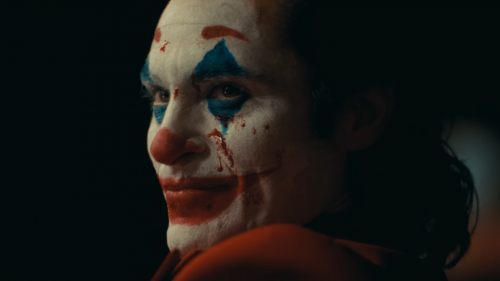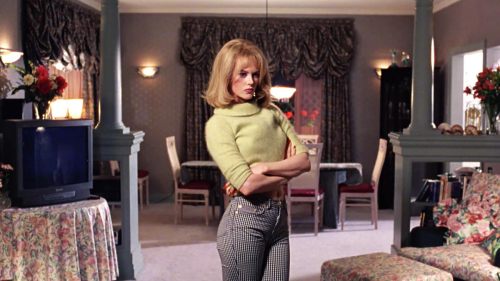TIFF 2019 Review: JOKER Is Too Shallow To Be Provocative
Todd Phillips wants to rile us up. His new film Joker, a DC Cinematic Universe gun-for-hire job that mutated into an auteurist inflection on the studio tentpole somewhere along the way, aims to shock by glorifying a yowling, enraged cynicism epitomized in one Arthur Fleck (Joaquin Phoenix, winnowed down to skin and protrusive bone). He’s a man who’s finally had enough, and decides to do something about it by going on a violent rampage with a sizable body count. He commits shocking and heinous acts, and the film appends a cathartic edge to his behavior in an effort to give the audience a jolt. The world’s assorted motherfuckers — uncaring politicians, celebrity meanies, absent fathers, all of them conflated in Fleck’s fevered mind — get what they deserve, to paraphrase the antihero. The villain we all know as the Joker may be a bad guy, but what does it mean to be “bad,” really?
Judging from all the Scorsesean perversions of the alienation and delusion themes in Taxi Driver and The King of Comedy, Phillips would like to launch one of those conversations about depiction vs. endorsement that tend to hang, albatross-like, on Marty’s best work. Fortunately, we can spare ourselves the trouble this time around; the pre-packaged controversy built into the film rings false at every juncture, a poseur for actual eyebrow-raising vitriol. The shooting script circulated among those in the know included a few sincerely appalling touches, which have been dutifully scrubbed from the finished edit as if to hit a sweet spot of “enough to get them mad, but not so mad that anyone gets canceled.” There’s a more blithely offensive version of this film out there in the ether, and while it would not make all this ‘better’ by any criteria, it’d certainly make for a more interesting conversation.
Instead, we get a would-be primal scream that can only huff and puff without blowing anyone’s house down. The world keeps shitting on Arthur via methods absurd both in their comic tinge as well as their blatant implausibility. We join our man at work as a clown-for-hire, busying himself with sign-spinning for the day. For no other reason than casual malevolence, a gaggle of hooligans make off with his sign, lure him into an alley, and proceed to beat the snot out of the poor guy. “Beat him up!” yells their ringleader. “Kick him!” Unless you already believe that children are predisposed to recreational cruelty, their behavior makes no sense. This kind of thing happens to Arthur a lot, echoing the average high schooler’s oft-repeated complaint that everyone’s against them.
Among the weak-tea expressions of Arthur’s inner torment before the blood starts flowing: writing “I hope my death makes more cents [sic] than my life,” scrawling out the middle two words on a “Don’t Forget To Smile!” sign, and manually mushing his face into a grin while staring into the mirror. Mostly, though, he releases the pain building up inside him through bursts of crow’s-caw laughter attributed to an unusual medical condition. We’re meant to pity him, a notion driven home by his dreary home life comprised of an invalid mother (Frances Conroy) and an unrequited crush down the hall (Zazie Beetz). He grew up without a dad, dreams of stand-up stardom that will never come, and feels closest to a Johnny Carson stand-in (Robert De Niro) he watches nightly. Eventually, he has to snap.
When he finally does, Phillips builds to a climax of chaotic evil that certainly ranks among the most technically accomplished sequences of his career. Setting aside the fact that that particular bar has been set limbo-stick low, his pseudo-edgy sermonizing robs the final scenes of the impact their filmmaking would otherwise earn. The Joker says “society” like a bad word, unaware that that makes him sound more like a basement-dweller yelling into his computer screen than the combination prophet/grim reaper he and Phillips would like him to be. Phoenix delivers a wholly committed performance of tic-heavy physicality, and yet it still feels like he’s making the most of what he’s been given to work with. He’s at his best in barely contained silence, and never less imposing than when reciting Phillips’ speeches of bush-league resentment. It’s hard to buy that the citizens of Gotham would adopt such a whiny rebel as a symbolic hero for his crimes against the ruling class, and even harder to imagine a real human being doing the same.
Up here in Toronto, I saw a film called The Painted Bird. An unsparing chronicle of the unending tragedies befalling one unlucky kid during the Holocaust years, it drained and frightened and horrified me. It made me want to leave, like half of the attendees at its Venice Film Festival premiere, and forced me to stay put in my seat. It makes a truly sickening statement about suffering and desperation and senseless savagery, beholding the full force of these mature concepts. Todd Phillips may have flown out of Italy with the Golden Lion, but at the end of the day, he can only dream of possessing such power.



